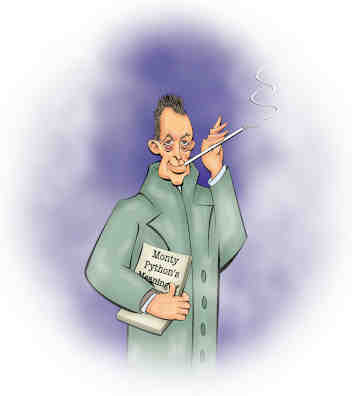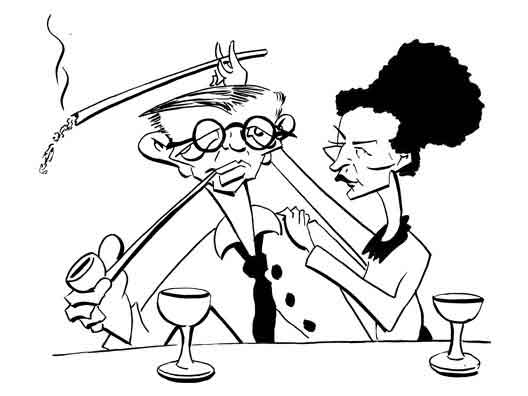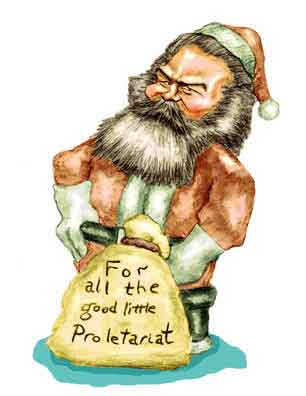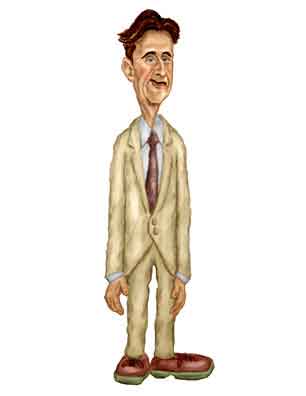Albert Camus
(Or When is an Existentialist Not an Existentialist?)

Big Al |
"Non, je ne suis pas existentialiste. Sartre et moi nous nous étonnons toujours de voir nos deux noms associés."
|
Yes, one of the most famous existentialist philosophers said that, no, he himself was not an Existentialist and that Jean-Paul Sartre, the nost famous Existentialist in the world, and he were always astonished to see their two names associated.
Then why do so many people say Albert was an Existentialist? Well, that's the problem with philosophers! It seems that you can't just read what they say they are! Instead you have to read what others say they are! Certainly when you have a goodly part of your musings written up in novels, it can be a bit of a challenge to sort out the philosophical wheat from the fictional chaff. On the plus side, with enough philosophical fiction, you just might land a Nobel Prize. At least that did it for Albert.
Fortuantely for those wanting to understand his philosophy, Albert also wrote serious think pieces. Probably his most famous essay is "The Myth of Sisyphus" where he writes about the absurdity when human being try to find consciousness and meaning of a universe that clearly operates without any conscious meaning. And despite his pooh-poohing the label, what Albert wrote sounds an awful lot like Existentialism.
But just what is this "Existentialism"? We've always wanted to know what that is.
No doubt you have, as Captain Mephisto said to Sidney Brand. It's very simple really.
Early philosophers like Aristotle thought that no real object exists unless there is a fundamental essence of the object already existing in nature. So to create a table, we must already be aware of a table's essence. Otherwise we wouldn't know how to build it or recognize one if we saw it. So as far as Aristotle was concerned, essence must precede existence.
Au contraire, say the Existentialists. The object must exist first. Only then can we determine its defining characteristics - that is, can we determine its essence. Or as the Existentialists say, existence precedes essence.
And if existence always comes first, they add, then any essence must be a human invention. That includes moral codes and even the very concept of right and wrong. So to put everything in its proper philosophical nutshell, Existentialism is the philosophy that the world is a crazy place with no coherent meaning.
And yet, they point out, people still have free will and so are still responsible for their actions. In fact people are far more responsible for their actions in an existentialist world than if they live by some pre-ordained higher creed dictated by some higher being that no one can quite figure out what he wants us to do. In the end it is up to people to decide what kind of world they want to live in. This, the existentialists say, is an incredibly optimistic and yet morally demanding philosophy.
Of course, the most famous Existentialist was Jean-Paul Sartre. But if Big Jean-Paul is the Existentialist #1, Albert Camus1 - despite his pooh-poohing of the identification - is not far behind.

Jean-Paul and Simone
Footnote
Albert's name, by the way, is correctly pronounced "al-BAIR keh-MOO", not "AL-bert kah-MUS". In French a lot of hard consonants are often not pronounced.
Also there's a bit of a brou-hah-hah about Jean-Paul's last name. You'll often hear American pronounce it like "SAHRT" while others say "SAHR-truh". Actually the French is a bit closer to the latter way of speaking. But the real "r" in French is what linguists call a voiced uvular fricative. You say "r" like in English but while rolling the uvula, the little flappy thing that hangs down in your throat. It's kind of like gargling.
It may help to realize the "ch" in Scottish "loch" is an unvoiced uvular fricative. A voiced consonant is one where you vibrate your vocal cords; in unvoiced consonants you don't. So if you say "loch" gently but vibrate the vocal chords and it might come out like the Parisian "r". Put a quick short "e" afterwords and you get the "-re" as in in "Sartre".
The reason why some American say "SAHRT" is that when French is spoken at normal speeds, the final "-re" is often inaudible to Yankee ears. So you'll also hear "LOOVE" for "Louvre".
Albert was not born in France. Instead, he came from Algiers which at the time was an "overseas department" of France. Born in 1913, Albert was a member of the group called the Pied-Noirs. For those who don't know your French this is pronounced "pee-YAY noh-WAHR" and means "Black Feet". The Pied-Noirs were born in Algiers but of French or otherwise European ancestry. They also included the large mostly Sephardic Jewish community. The trouble was the Pied-Noirs were looked down on by the French in France, and they were resented as unduly privileged upper crusts by the indigenous Algerians who were of North African ancestry.
From the first there was trouble right there in Algiers City (and the rest of the country as well). For one thing the Pied-Noirs were granted French citizenship and the right to vote while the Muslim Algerians were not. With this situation it was inevitable that, well, that "troubles" would break out and nothing really settled down until 1962 when Algiers gained its independence and became Algeria. Almost all of the Pied-Noirs left the country for France.
Albert studied at the University of Algiers and graduated in 1936 with the diplôme d'études supérieures. Although troubled by recurring attacks of tuberculosis (which his heavy smoking certainly didn't help), he traveled in Europe and returned to Algiers where he worked as a journalist while also writing plays and even acting in the local theaters.
By March 1940, though, Albert was back in France, living in the Montmartre area of Paris andworking on a novel that later became L'Étranger (The Stranger also called The Outsider). But Paris wasn't the greatest place to be since on May 14, the Germans moved around the Maginot Line into France. The British fell back to Dunkirk (and crossed the Channel) and on July 14, the German troops marched into Paris. Two days later the hero of World War I, Henri-Philippe Petain became the French prime minister and he officially surrendered the the Germans on June 24. Charles DeGaulle, leader of the Free French Forces, broadcast a call for all French citizens to resist the Germans, a broadcast, we should point out, was made while he was in England.
Although the armistice agreement stipulated the southern part of France would remain - quote - "independent" - unquote - as Vichy France, the Germans took control of the western coastal areas and the north (including Paris). Albert joined the French Resistance and published the Resistance newspaper Combat. Needless to say this was a dangerous activity.
How much Jean-Paul Sartre fought the Germans is debated. Some say he was a major player in the Resistance and his plays were peppered with hidden anti-Fascist messages. If so, the messages were so well hidden that the German censors saw nothing amiss and allowed the plays to be performed. German officers were also given front row seats and invited to the opening night parties. But to be fair it is also said that Jean-Paul wrote anti-German articles for the underground newspapers including Combat, and it should be remembered that much of the Resistance activities were not actively opposing the Germans with force of arms but providing military intelligence to the Allies. So buttering up the Germans was a good way to get them to drop their guard and blab about what was going on.
During the War, though, Albert had The Stranger published. This book plus his earlier journalism quickly established him as a major writer and, yes, philosopher. And with Jean Paul delivering his famous 1945 lecture L'existentialisme est un humanisme - sometimes less loquaciously translated as Existentialism - and it's later publication as a book, it was natural for everyone to see Albert shoulder-to-shoulder with Jean-Paul and his friends.
So why has Albert been dubbed an Existentialist when he said he wasn't? After all, don't their writings and the results of Albert's and Jean-Paul's philosophies all pretty much lead to the same conclusions?
The truth is Albert couldn't consider himself an Existentialist because he disagreed with the fundamental Existentialist principle that existence precedes essence. Instead he held a view of the natural world that mandated that there was an essence that precedes existence. So no matter what the practical effect of his philosophy and where it ends up, he just couldn't see Jean-Paul and himself as brother Existentialists.
But as you might expect, it wasn't just philosophy that separated Albert and Jean-Paul. Instead it was (yes) politics. In their early years, they both leaned way to the left, and as a young man Albert had joined the Communist Party even though you'll also read that he left the party in disillusionment after a couple of years. Actually he got booted out since he didn't take to the anti-colonial stance as much as the Big Bosses wanted and in fact had been against Algerian independence. Later Albert specifically emphasized he was a socialist, not a Communist and he definitely was not a Marxist. Naturally the Communists and Marxist were quite miffed at Albert's rejection of their materialistically dialectal doctrine.

Karl
Jean-Paul agreed.
Here's where Jean-Paul and Albert diverged. Even though Jean-Paul was never an actual party member, in general he looked with favor on the governments that were founded on the musings of Karl Marx. He and Albert became rather testy with each other since Albert thought Jean-Paul should denounce the Soviet dictatorship and the labor camps. For his part Jean-Paul was appalled that Albert did not favor Algerian independence and that he was knuckling under to the colonial era imperialism of which France had so long excelled.
On the other hand, Jean-Paul Sartre was certainly not a Russia-Right-Or-Wrong flambé. In 1956 he denounced the Soviet invasion of Hungary and in 1968 he lambasted Russia for invading Czechoslovakia. But some authors say that Jean-Paul, CP membership or not, was still idealistically a Marxist. Of course, others say he wasn't, and still others say that sometimes he was and sometimes he wasn't. But whatever he really thought, Jean-Paul never renounced Marxism per.
But there's no such doubt about Albert's thoughts about what is now increasingly dumped on as a bankrupt philosophy. He was a committed socialist but despised totalitarianism in general and Communism (note the capital "C") in particular.

George
Politics Akin to Albert's
Albert's politics, then, were much like those of George Orwell. The irony is that both men's open denunciation of Communism has led to their being hailed as heroes by people who would denounce their philosophy if they bothered to read their books. Studies have found that a good part of those who claim to have read George's novel 1984 have not, and it got to the point that George even had to go on record and say that both Animal Farm and 1984 were not anti-socialist writings.
Although Albert loved writing for the theater, his plays such as Caligula and Les Justes (The Just) are not considered as successful as his prose. But even with his essays, it's probably fair to say that Albert was primarily a novelist.
But like George, Albert also wrote journalism and essays which - literally - could fill volumes. True, getting through the more serious thought-pieces can be quite a chore, and his most famous essay, The Myth of Sisyphus, is actually better described as a series rather than a single essay. It runs a hundred pages.
Not quite as long is the article that serves as an introduction to Albert for many a student. That's his "Reflections on the Guillotine" which was a call for the abolition of the death penalty. Of course, Albert was not naïve and he said that if France couldn't see it to abolish the death penalty right away, it should at least do away with the guillotine. Alas, the abolition of either the guillotine or the death penalty never happened during Albert's lifetime and it wasn't until 1981 that France finally abolished the "national razor" or any variant thereof.
By then Albert was dead and gone. On January 4, 1960, he had been on vacation down in Vaucluse near the French Alps. With him were his wife, Francine, and their two teenage daughters as well as the publisher Michel Gallimard and Michel's wife and daughter.
Francine and the girls returned home by train and the others went back later in Michel's Facel Vega. About 60 miles south of Paris and for reasons unknown, the car veered from the road and plowed into a tree. The report stated that the road was clear and dry and Michel wasn't speeding. This may have been true but the car was pretty much demolished. Although Michel's wife and daughter were not hurt, Albert was in the front passenger seat and was killed instantly. Michel had been driving and was so badly injured that he died five days later. Years later a sinister report of foul play materialized but few historians buy into it.
Out of all his honors, Albert did reach the top. In 1957 he won the Nobel Prize in Literature and he traveled to Stockholm for the ceremony. Four years later Jean-Paul Sartre also landed the Prize but he declined the award. Jean-Paul said he was simply standing on his principles that authors shouldn't become institutions. A number of articles have delved further into Jean-Paul's motives, not all of which mention that later, principles or not, institution or not, he asked the Nobel Committee if he could have the money anyway. Existentialism, it seems, didn't pay that well.
References
"Albert Camus", Stanford Encyclopedia of Philosophy, October 27, 2011, (Revision April 10, 2017).
"Albert Camus", John Cruickshank, Encyclopedia Britannica, March 23, 2021.
"Why Camus Was Not An Existentialist", Greg Stone, Philosophy Today, 2016.
"Paris from Camus's Notebooks", Alice Kaplan, The Paris Review, September 19, 2016.
"January 4, 1960: Albert Camus Dies In a Car Crash, Age 46. His Books Make Him Immortal", Huffington Post, March 18 2010 (Updated May 25, 2011).
"Contemporary German Philosophy", Arthur Liebert, The Philosophical Review, Vol. 42, No. 1, pp. 31-48, 1933.
"How Did Albert Camus Die?", Haley Bracken, Encyclopedia Britannica.
"Camus at War", Mark Henninger, America, The Jesuit Review, March 12, 2014.
"Literature", Stephen Fry (presenter), Alan Davies (permanent panelist), Victoria Coren Mitchell (guest panelist), Lloyd (guest panelist), Jack Whitehall (guest panelist), Qi, BBC, October 17 ,2014 Internet Movie Data Base.
Manhunt of Mystery Island, Roy Barcroft (actor), Richard Bailey (actor), Linda Stirling (actor),Spencer Bennet (Director), Ronald Davidson (Producer), Republic Studios (1945), Internet Movie Data Base.
Return to Albert Camus Caricature